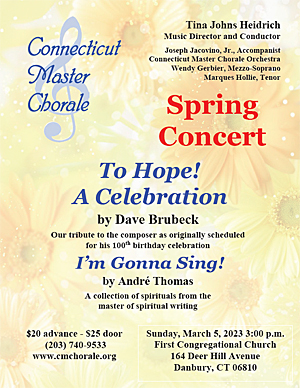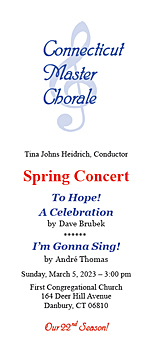To Hope! A Celebration
by Dave Brubeck
~ plus ~
I'm Gonna Sing!
by André Thomas
Spring 2023 Concert Notes
Tina Johns Heidrich, Conductor
Joseph Jacovino, Jr., Accompanist
Wendy Gerbier, Mezzo-Soprano
Marques Hollie, Tenor
Connecticut Master Chorale Orchestra
Sunday March 5, 2023 - 3:00 pm
First Congregational Church, Danbury, Connecticut
- Soloists - Concert Photos -
These concert notes were prepared by soprano Ginnie Carey.
I’m Gonna Sing! – André Thomas
A collection of spirituals by the master of spiritual form

André Thomas
(b. 1952)
André J. Thomas is a conductor, composer and arranger who is especially well known for his unique arrangements of traditional spirituals. After a long and distinguished teaching career at the university level, Dr. Thomas was appointed the visiting professor of choral conducting and interim conductor of the Yale Camerata at Yale for 2020 - 2021. In May 2022 he was appointed an Associate Artist with the London Symphony Orchestra for three years. During his tenure he will expand the repertoire that the LSO routinely performs, introducing the American gospel tradition and works by contemporary African American composers to audiences in the United Kingdom.
- I’m Gonna Sing! – This version of the traditional spiritual has the Spirit telling us to sing, dance, pray and shout, but there is a long-standing custom in some churches and other situations of changing the words to match current issues or events.
- Band of Angels – This piece is based on several different folk sources which describe enslaved peoples' beliefs about angels: Angel Band; All Night, All Day; De Angel in Heab'n Gwinter Write My Name; and De Band of Gideon. In Dr. Thomas' commentary, he suggests that these heavenly figures became particularly important because of the promise of a new life in heaven. The people held in bondage felt they could have contact with the angels, since they exist both in heaven and on earth, and that on their deaths those same angels would carry them to Glory.
- Keep Your Lamps – In the composer's note for this piece, Dr. Thomas relates that many songs of the enslaved people came from hearing sermons about the Bible, in this case the parable of Jesus in Matthew 25:1-13 about the bridesmaids waiting with their oil lamps for the bridegroom to arrive. Half of them did not bring enough oil to last until the bridegroom came. While they left to buy more oil, the bridegroom arrived and the half who did have lighted lamps went inside with him for the feast and the others were locked out. The message of Jesus to always be ready for his return was of great importance to a people waiting for earthly as well as heavenly deliverance.
- Swing Down Chariot – Also known as Swing Down, Ezekiel, this spiritual tells of Ezekiel's vision of the chariot which would take the enslaved to their home in heaven "on the other side". Some scholars believe that "the other side" was also a euphemism for the Underground Railroad.
- Beautiful City – Oh, What a Beautiful City, with the twelve gates to the city from Revelations 21, and In Bright Mansions Above, based on John 14:2 where Jesus speaks of the many mansions in His Father's house, have been combined by Dr. Thomas to create this splendid arrangement in which they flow together, forming a vision of heaven for the enslaved people who look forward to being there.
- Deep River – First printed in the 1867 first edition of The Story of the Jubilee Singers: With Their Songs, Deep River is regarded by many as the most beloved of all spirituals. The use of metaphor and double meaning was useful for people who were not allowed to express themselves freely. The longing to be crossing over the river to a place of peace is understandable for people who are trapped in a life of slavery. It was recorded by Marian Anderson, Paul Robeson, Mahalia Jackson and many others.
- If you’re Happy / Amen – The traditional children's song, If You're Happy, is entwined by Dr. Thomas with the spiritual, Amen, resulting in uplifting enjoyment for all!
- John Saw Duh Numbuh – This spiritual tells the story of John and his amazing vision in Revelations 7 of the crowd of 144,000 coming from all directions. Dr. Thomas creates a wonderful, dynamic setting for this remarkable event.
See the Sheet Music autographed to Tina by André Thomas.
When the Library of Congress designated Mr. Brubeck a "Living Legend" in 2003, he was recognized as "one of America's all-time greats in the field of jazz and a seminal force in making jazz popular in the U.S. and throughout the world". He also received many other prestigious awards, including the National Medal of the Arts, the Smithsonian Medal and a star on the Hollywood Walk of Fame. President Barack Obama bestowed the Kennedy Center Award to him on his 89th birthday.
He was also a man of principle who led by example throughout his life. While serving in the Army in Europe during WWII he led an integrated band. In the segregated South he refused engagements rather than replace African American Eugene Wright as a member of his quartet and cancelled a television performance when he found that the directors were intending to film without showing Wright. In 1954, he was featured on the cover of Time magazine and was embarrassed because he thought that Duke Ellington was more deserving but was ignored because of his race.
Later, during the Cold War, his State Department-sponsored tours exposed people throughout the world to America through jazz music. In turn, his own music was also influenced by that of the different cultures he experienced during many international tours.

Chris Brubeck with Tina Heidrich
at the March 2000 Chorale
performance of To Hope!
Dave Brubeck became a legend in the 1950s for his iconic and revolutionary jazz, but most of those adoring fans were completely unaware that he was a classically trained musician. During a career lasting more than six decades, he also created a substantial body of innovative secular and religious works integrating classical music with jazz.
To Hope! A Celebration was commissioned by the Catholic publication Our Sunday Visitor in 1979. Mr. Brubeck often mentioned this work as one of the highlights of his career, and was especially pleased with the performances in St. Stephen's Cathedral in Vienna and in Moscow with the Russian National Orchestra and the Orloff choir. It has been performed throughout the English-speaking world and Europe.
An exciting work of grand proportion, To Hope! is a monumental affirmation of hope and exultation. It is powerful, multifaceted, and displays his superb choral writing ability with profoundly moving passages, dance-like rhythms, deep emotion and a strong sense of optimism.
Our program today was originally scheduled in 2020 as a part of the official world-wide celebration Dave Brubeck 100, commemorating what would have been his 100th birthday. We are delighted to finally present the concert we planned in honor of this remarkable man.
Dave Brubeck's personal note on To Hope!

Dave Brubeck
(1920 - 2012)
"The heart of the Mass is found in the words themselves, living language full of deep meaning, born from the very human need to know God. It is language shaped by tradition and honed fine by usage, embodying within it the seeds for understanding. I approached the composition as prayer, concentrating upon the phrases, trying to probe beneath the surface, hoping to translate into music the powerful words which have grown through the centuries.
"Emotions that are life, from sorrow to exaltation, were part of my experience in writing To Hope! When the work was complete, I felt a strong sense of wholeness and affirmation. I pray that those who experience the work will share my feelings."
- Dave Brubeck




